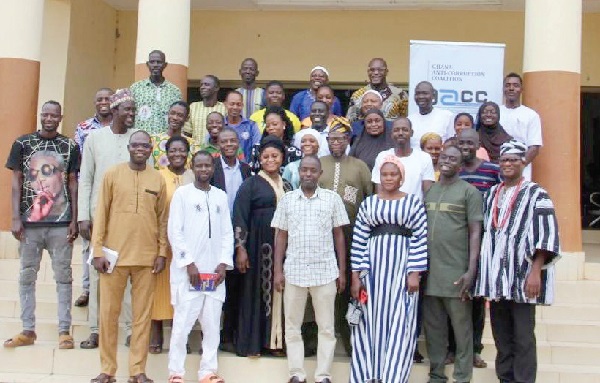
Fighting corruption: GACC intensifies sensitisation in Northern Region
Corruption remains a significant challenge in Ghana, undermining development, governance and public trust.
The stark reality of Ghana's struggle with corruption is underscored by its below-average performance on critical indices.
Between 2010 and 2019, the Government Effectiveness Index rated Ghana at just 48.2 per cent. Transparency International’s Corruption Perception Index reflects a troubling trend, with Ghana averaging a score of only 43 per cent from 2020 to 2022.
Similarly, the 2022 Afrobarometer survey, conducted by CDD-Ghana, along with the Ghana Statistical Service and CHRAJ’s Corruption Survey, revealed that over 75 per cent of Ghanaians perceive an increase in corruption.
These statistics highlight severe systemic weaknesses in governance, rule of law, and anti-corruption enforcement.
In the Northern Region, a crippling culture of fear and silence has long discouraged people from confronting the rampant corruption that plagues their communities.
Despite being directly affected by its devastating consequences, people are hesitant to speak out for fear of victimisation and mistrust in the system.
This toxic silence has entrenched a cycle of corruption that seems almost insurmountable.
However, the impact of such corruption is acutely felt by the poor, as funds meant for development are siphoned away, undermining efforts to alleviate poverty and drive development.
While citizens and civil society organisations have made intermittent efforts to improve accountability and the rule of law, these initiatives have often been hindered by a lack of awareness and resources.
Project
To address these challenges, a consortium of non-governmental organisations (NGOs) are implementing the Strengthening Accountability, Rule of Law, and Institutional Responsiveness in Ghana (SARIS) project.
This 36-month initiative, running from January 2024 to January 2027 is being implemented by the Centre for Democratic Development Ghana (CDD Ghana), Ghana Integrity Initiative (GII) and Ghana Anti-Corruption Coalition (GACC), with funding support from the European Union (EU).
Implemented in 24 districts across the country, the project seeks to empower local Civil Society Organisations (CSOs), Community-Based Organisations (CBOs), women’s associations, youth groups, and citizens to demand accountability and combat corruption.
Under the SARIS project, about 240 participants in selected districts in the Northern, Bono and Ahafo regions have already received training in various corruption reporting mechanisms, accountability, transparency and significance of civic engagement in anti-corruption efforts.
Some of the beneficiary districts are Savelugu, Tatale-Sangule, Kumbungu and Yendi.
During a recent sensitisation workshop in Savelugu, the Executive Secretary of GACC, Beauty Emefa Narteh, emphasised that educating citizens about corruption's detrimental effects would inspire them to take action to safeguard public resources.
She explained that the project employed a three-pronged strategy - empowering citizens to utilise corruption reporting mechanisms, supporting investigative journalism, and advocating legislative reforms.
She said if citizens were proactive in reporting corruption issues, they would significantly reduce its prevalence at the local level.
Barrier
The Northern Regional Director of CHRAJ, Mohammed Tiamiyu, in a speech read on his behalf, pointed out that corruption was not merely a perception but a tangible barrier to societal development.
He admonished the participants to make good use of the Whistleblower Act which provided protection for citizens reporting corruption.
A consultant for the SARIS project, Kwesi Boateng Assumeng, highlighted the importance of advocating reforms in public ethics, asset declaration, political campaign financing, and internal controls.
He encouraged participants to leverage anti-corruption platforms and report related cases.
Participants in the workshop who spoke to the Daily Graphic expressed their gratitude for the knowledge and tools provided, pledging their commitment to the fight against corruption in their respective communities.
A participant from the Savelugu Youth Home, Yakubu Barkisu, said she had learnt how to report corruption related issues whenever she suspected corruption in a deal.
She said hitherto she thought demanding accountability from authorities was the sole responsibility of journalists and law enforcement agencies, but now she would be able to use the Right to Information law to demand accountability.
Another participant from Kumbungu, Abdul Salam Alhassan, thanked the organisers for the training and pledged to use the knowledge acquired to fight against corruption and demand accountability in his community.
Writer’s email: mohammed.fugu@graphic.com.gh
